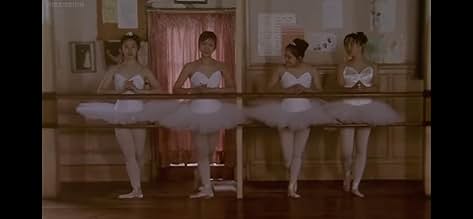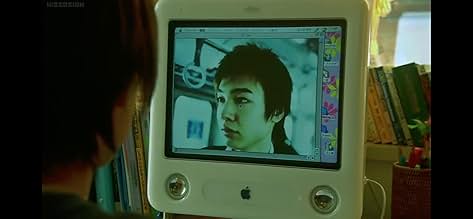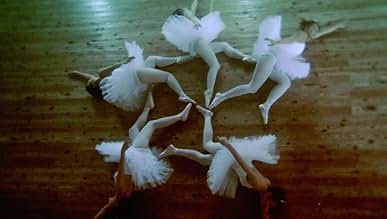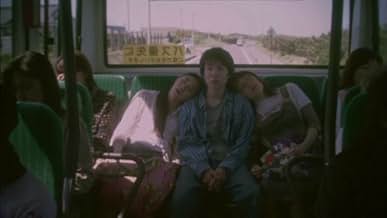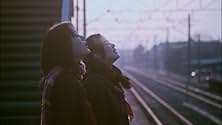Hana to Arisu
- 2004
- 2h 15m
ÉVALUATION IMDb
7,2/10
5,2 k
MA NOTE
Ajouter une intrigue dans votre langueWhen two best friends develop a crush on the same boy, they develop a plan to trick him into dating them.When two best friends develop a crush on the same boy, they develop a plan to trick him into dating them.When two best friends develop a crush on the same boy, they develop a plan to trick him into dating them.
- Prix
- 1 victoire au total
Avis en vedette
Near the end of Mike Leigh's Vera Drake (trivial spoiler about Vera Drake but not about Hana and
), Imelda Staunton's Vera stands accused, caught, guilty. For what seems an eternity of fictional if not real time, before an ever-expanding body of those-who-know, she displays, in her eyes and quivery cheeks and chin, her shame. Shame's a fluid thing, grows, changes as one's conscience, if that's what it is, reaches about for new embarrassment on which to feed, and so is Vera's face in these scenes ever-changing. Time races, falls with a dreadful weight, but at the same instant it stops dead. Such embarrassments eventually slip our minds. Everyday rote erases them. We banish, delete, forget them, as well as we can, but they never exactly end. Each moment itself is something like eternal.
Elsewhere I've remarked the map-ability of Iwai's films: Uchiage hanabi, shita kara Miruka? Yoko kara Miruka? (1993) with both it's title conundrum and the on-the-road debarkation point for the alternate endings; April Story with its out-of-place fly casting; Love Letter in which doppelganger heroines overlap in space but never meet; Picnic whose protagonists walk the top edge of a wall that miraculously traverses their city; Yentown where the map one lives represents one's caste. Lily Chou Chou I haven't found time yet to re-watch and digest, but its characters travel, both locally and afar to that "Disney Jungle Ride" bit, and its concert throng near the end moves in a single direction that killer moves against. Motion needs map-able space. Iwai playing a film "director," in Hideyaki Anno's Ritual, walks/strolls/travels into and through the story and the maybe-mad girl's space. Undo has none of this. You hardly know where one set is in relation to another, as if linear space has collapsed into Moemi's bindings.
In Hana and Alice as in Undo, only the protagonists connect sets: trains, school, parkland, dance floor, etc. If anything in it is map-able, it's the two girls', and deadpan Miyamoto's, faces. Whether she's scheming, at a loss, or caught, Hana's face quivers with unceasing thought, at least as credibly and no less momentously than Vera caught. Like many liars, Hana thinks too much. She hasn't mastered yet the art of not thinking, seems not to realize the ease and simplicity of truth-telling. We see, much more often than hear, what Hana is thinking. Though the film's full of music, Hana's pre-verbal, or anti-verbal, thoughts reach us as if in dead silence, in what sounds like silent-film silence. Iwai's camera and his choice of close-ups of both girls suggest he knows this. I imagine Iwai cast Suzuki as Hana because of this silent ability. She'd displayed it to less merit in Returner. Aoi plays Alice less externally, or at least less facially. (My terminology's confusing. Alice is more of an introvert, perhaps, so uses body language which is external. But her face, early on, reveals less.) Note her mime-like dance in the animal suit: She slowly, magically reenters Hana's and our perception. At first Hana and we, for Hana, don't know whether to be annoyed. Is it one of those annoying stalking mimes? Is it sane?
Besides in faces, map Hana and Alice in Time. Amnesia's about losing Time, time already used, already spent, used up, gone, and so wasted if not remembered. The plot's machinations, Miyamoto's beyond-belief credibility, his in and out, on and off belief in the branchings of Hana's out-of-control lie, bend Time. Hana hands him a past, a chunk of time, then implicates Alice in yet another. Riding Hana's materialized daydream, Miyamoto travels to and fro, back and fore, but not in space. Hana and Alice is Iwai's La jetée.
But guess what! The film is hilarious. I can't think offhand of another film as simultaneously pictorial, euphonious, and simply funny. The humor is anything but situational. It has the warming reality of the everyday, of things and people we all know, because it transpires in the two girls cheeks, brows, and eyes.
There was a temptation to call H & A All About Lily Chou Chou's light antithesis. I don't feel that, choose not to. For touch points, besides La jetée and silent film, look maybe to Shakespeare's comedies, maybe even to his noisome clowns.
Elsewhere I've remarked the map-ability of Iwai's films: Uchiage hanabi, shita kara Miruka? Yoko kara Miruka? (1993) with both it's title conundrum and the on-the-road debarkation point for the alternate endings; April Story with its out-of-place fly casting; Love Letter in which doppelganger heroines overlap in space but never meet; Picnic whose protagonists walk the top edge of a wall that miraculously traverses their city; Yentown where the map one lives represents one's caste. Lily Chou Chou I haven't found time yet to re-watch and digest, but its characters travel, both locally and afar to that "Disney Jungle Ride" bit, and its concert throng near the end moves in a single direction that killer moves against. Motion needs map-able space. Iwai playing a film "director," in Hideyaki Anno's Ritual, walks/strolls/travels into and through the story and the maybe-mad girl's space. Undo has none of this. You hardly know where one set is in relation to another, as if linear space has collapsed into Moemi's bindings.
In Hana and Alice as in Undo, only the protagonists connect sets: trains, school, parkland, dance floor, etc. If anything in it is map-able, it's the two girls', and deadpan Miyamoto's, faces. Whether she's scheming, at a loss, or caught, Hana's face quivers with unceasing thought, at least as credibly and no less momentously than Vera caught. Like many liars, Hana thinks too much. She hasn't mastered yet the art of not thinking, seems not to realize the ease and simplicity of truth-telling. We see, much more often than hear, what Hana is thinking. Though the film's full of music, Hana's pre-verbal, or anti-verbal, thoughts reach us as if in dead silence, in what sounds like silent-film silence. Iwai's camera and his choice of close-ups of both girls suggest he knows this. I imagine Iwai cast Suzuki as Hana because of this silent ability. She'd displayed it to less merit in Returner. Aoi plays Alice less externally, or at least less facially. (My terminology's confusing. Alice is more of an introvert, perhaps, so uses body language which is external. But her face, early on, reveals less.) Note her mime-like dance in the animal suit: She slowly, magically reenters Hana's and our perception. At first Hana and we, for Hana, don't know whether to be annoyed. Is it one of those annoying stalking mimes? Is it sane?
Besides in faces, map Hana and Alice in Time. Amnesia's about losing Time, time already used, already spent, used up, gone, and so wasted if not remembered. The plot's machinations, Miyamoto's beyond-belief credibility, his in and out, on and off belief in the branchings of Hana's out-of-control lie, bend Time. Hana hands him a past, a chunk of time, then implicates Alice in yet another. Riding Hana's materialized daydream, Miyamoto travels to and fro, back and fore, but not in space. Hana and Alice is Iwai's La jetée.
But guess what! The film is hilarious. I can't think offhand of another film as simultaneously pictorial, euphonious, and simply funny. The humor is anything but situational. It has the warming reality of the everyday, of things and people we all know, because it transpires in the two girls cheeks, brows, and eyes.
There was a temptation to call H & A All About Lily Chou Chou's light antithesis. I don't feel that, choose not to. For touch points, besides La jetée and silent film, look maybe to Shakespeare's comedies, maybe even to his noisome clowns.
After the dark world of _All About Lily Chou Chou_ in which junior high kids are involved in prostitution, extortion, and murder, Iwai returns with _Hana and Alice_, a film that brings the audience to the tried and true theme of the love triangle. This time involving the young trio of Hana, Alice, and Masashi.
The story begins with the friends Hana, acted by Suzuki Anne, _Returner_, _9 Souls_, and Alice, Aoi Yu, _All About Lily Chou Chou_, _Harmful Insect_, crossing frozen fields to a distant train station. There, Alice shows Hana the object of her affection: a tall Japanese-American. The two girls ride the the train many times. Even taking secret photographs of biracial young man and a younger student who they assume is his half-brother.
However, eventually, Alice's crush is gone and only the younger man, whose nose is always in a book, rides the train. Alice is heartbroken, But Hana continues riding the train, affection for the young man growing in her heart.
When high school begins, Hana joins the Rakugo club because her crush, Miyamoto Masashi, is also a member of the club. One day, while following her crush, Hana witnesses Masashi hits his head hard on a garage door knocking him to the ground. Hana rushes up to him and asks him if he is okay. Masashi begins reciting some of his rakugo lines and is convinced that he is okay, but Hana asks him if he remembers her. On this he is not so clear, Hana then states that she is his girlfriend. This of course shocks Masashi and so begins the process of Masashi trying to recover from an amnesia created by the lovesick Hana.
I was worried by the premise of this film at first, because it has been done a number of times before. However, I should have had more faith in Iwai Shunji. This is truly a good film and it really tugs on the heart strings. Those of us who have had our love for someone else non-reciprocated while definitely be touched. The acting is well done. Especially that of Aoi Yu who played Tsuda Shiori, the young girl forced to be a prostitute in _Lily Chou Chou_. The music, as always, is very nice, and this time it was actually composed by Iwai Shunji.
The story begins with the friends Hana, acted by Suzuki Anne, _Returner_, _9 Souls_, and Alice, Aoi Yu, _All About Lily Chou Chou_, _Harmful Insect_, crossing frozen fields to a distant train station. There, Alice shows Hana the object of her affection: a tall Japanese-American. The two girls ride the the train many times. Even taking secret photographs of biracial young man and a younger student who they assume is his half-brother.
However, eventually, Alice's crush is gone and only the younger man, whose nose is always in a book, rides the train. Alice is heartbroken, But Hana continues riding the train, affection for the young man growing in her heart.
When high school begins, Hana joins the Rakugo club because her crush, Miyamoto Masashi, is also a member of the club. One day, while following her crush, Hana witnesses Masashi hits his head hard on a garage door knocking him to the ground. Hana rushes up to him and asks him if he is okay. Masashi begins reciting some of his rakugo lines and is convinced that he is okay, but Hana asks him if he remembers her. On this he is not so clear, Hana then states that she is his girlfriend. This of course shocks Masashi and so begins the process of Masashi trying to recover from an amnesia created by the lovesick Hana.
I was worried by the premise of this film at first, because it has been done a number of times before. However, I should have had more faith in Iwai Shunji. This is truly a good film and it really tugs on the heart strings. Those of us who have had our love for someone else non-reciprocated while definitely be touched. The acting is well done. Especially that of Aoi Yu who played Tsuda Shiori, the young girl forced to be a prostitute in _Lily Chou Chou_. The music, as always, is very nice, and this time it was actually composed by Iwai Shunji.
The base layer here is teenage romance tweaked a little to frame episodes of ordinary life. Two schoolgirls fall in love with an aloof boy who believes he suffers from amnesia.
Annotating this is Celine and Julie Go Boating, which was about two girls embarking upon dreamlike adventure and mischief around modern Paris. What was so remarkable about it were precisely the elusive controls: the film didn't give out that we were, in fact, daydreaming until we were too far in to know exactly where. The clue was already laid out in the first scene, a cat of mysterious eyes and a peculiar chase through empty streets.
So you will have to pay attention to the opening scenes of Iwai's film, echoing this. Once again a chase in and out of subway cars as giggly play between the two girls. The other clue is obvious enough: Alice.
This layer borrows Rivette's whimsical light structure. Roles, guises, fiction, synchronous games about the fabrication of narratives, in our case centered at this boy who remembers nothing, is empty space, a blank stage, and the plays the girls assemble around him. He's told he was in love with one, then both. They both act parts, fashion entire pasts and emotions.
So love as this game of fiction, and getting to allow to be seduced by an image. This is excellent work, and in how it's subtly acknowledged inside the film: one girl signs up for a drama class, and has in fact done so to be close to the boy, himself an actor, the other is randomly approached on the street to model for TV commercials - and this may well reference Mikio Naruse's wonderful Street without Return from '34.
So the third layer is how the play is going to be resolved on a level behind the base narrative of ordinary life, and into the stage where love is the heightened game of duplicity.
One ploy is simple enough, opening day for the school play both girl and boy were rehearsing and a near-perfect rendition of the mechanisms that give rise to images: out on the stage performance, roles, fiction consumed as real, and backstage the internal machinations of tortured soul. The other is a little more intricate because of how unassuming: Alice auditions for a part in TV commercial.
Now so far this is no different than a French film. Notice what Iwai does, an extra layer that is deeply Japanese. Now the Japanese idea of high beauty and by extension performance, what is often perceived as quaint reticence, is formless heart expressed in visible form. Meditation.
But even a patriarch of Chan like Hongren could not so simply gauge his pupils' inner heart when the time came to decide for a succesor. What he asked instead, was that they write poems on a wall about it. This is a frequent practice in Buddhism. Painting a cycle will do, an 'ensho' meaning awareness. The hand will tell.
Now all through the film Hana has secretly contrived to cling to her object of desire, has lied and deceived. But when it comes to expressing inner self, we note that she is, in fact, a bad actress. Iwai intercuts her melodramatic reactions backstage with the actor's mock-mannerisms out on the stage. The auditorium is empty when she finally gets out for her part.
On the other hand Alice. She has been part of the ploy but with a certain affection for the part and with genuine feelings. So much so that it slipped from her, a bad actress in terms of the conventional drama of the world. We trust however that even though the image is false, she's moved to it truthfully. Her audition is to play an image on a screen. Instead the director decides on a whim that he wants her to do a ballet dance as per her resume, and in a short skirt, an almost humiliating prospect. What does she do? Channeling true self into the thing, she amazes with her skills.
So what do we get, between these two girls? Flowers in the sky, Hana meaning flower, reflecting Zen Master Dogen's notions of illusory mind images.
And on the other hand, the subtlest difference. Emptiness in full bloom. Or in the words of Dogen: being one with just this, while being free from just this.
Something to meditate upon.
Annotating this is Celine and Julie Go Boating, which was about two girls embarking upon dreamlike adventure and mischief around modern Paris. What was so remarkable about it were precisely the elusive controls: the film didn't give out that we were, in fact, daydreaming until we were too far in to know exactly where. The clue was already laid out in the first scene, a cat of mysterious eyes and a peculiar chase through empty streets.
So you will have to pay attention to the opening scenes of Iwai's film, echoing this. Once again a chase in and out of subway cars as giggly play between the two girls. The other clue is obvious enough: Alice.
This layer borrows Rivette's whimsical light structure. Roles, guises, fiction, synchronous games about the fabrication of narratives, in our case centered at this boy who remembers nothing, is empty space, a blank stage, and the plays the girls assemble around him. He's told he was in love with one, then both. They both act parts, fashion entire pasts and emotions.
So love as this game of fiction, and getting to allow to be seduced by an image. This is excellent work, and in how it's subtly acknowledged inside the film: one girl signs up for a drama class, and has in fact done so to be close to the boy, himself an actor, the other is randomly approached on the street to model for TV commercials - and this may well reference Mikio Naruse's wonderful Street without Return from '34.
So the third layer is how the play is going to be resolved on a level behind the base narrative of ordinary life, and into the stage where love is the heightened game of duplicity.
One ploy is simple enough, opening day for the school play both girl and boy were rehearsing and a near-perfect rendition of the mechanisms that give rise to images: out on the stage performance, roles, fiction consumed as real, and backstage the internal machinations of tortured soul. The other is a little more intricate because of how unassuming: Alice auditions for a part in TV commercial.
Now so far this is no different than a French film. Notice what Iwai does, an extra layer that is deeply Japanese. Now the Japanese idea of high beauty and by extension performance, what is often perceived as quaint reticence, is formless heart expressed in visible form. Meditation.
But even a patriarch of Chan like Hongren could not so simply gauge his pupils' inner heart when the time came to decide for a succesor. What he asked instead, was that they write poems on a wall about it. This is a frequent practice in Buddhism. Painting a cycle will do, an 'ensho' meaning awareness. The hand will tell.
Now all through the film Hana has secretly contrived to cling to her object of desire, has lied and deceived. But when it comes to expressing inner self, we note that she is, in fact, a bad actress. Iwai intercuts her melodramatic reactions backstage with the actor's mock-mannerisms out on the stage. The auditorium is empty when she finally gets out for her part.
On the other hand Alice. She has been part of the ploy but with a certain affection for the part and with genuine feelings. So much so that it slipped from her, a bad actress in terms of the conventional drama of the world. We trust however that even though the image is false, she's moved to it truthfully. Her audition is to play an image on a screen. Instead the director decides on a whim that he wants her to do a ballet dance as per her resume, and in a short skirt, an almost humiliating prospect. What does she do? Channeling true self into the thing, she amazes with her skills.
So what do we get, between these two girls? Flowers in the sky, Hana meaning flower, reflecting Zen Master Dogen's notions of illusory mind images.
And on the other hand, the subtlest difference. Emptiness in full bloom. Or in the words of Dogen: being one with just this, while being free from just this.
Something to meditate upon.
2 teenage girls who are best friends are into the same boy ... Coming from Hollywood such a movie would be shallow for sure, in the style of numerous other high school comedies. Japanese director Shunji Iwai, however, managed to make a movie out of this material which has a lot of depth, a movie that is rich of subtle, moving moments. Rather than showing a simple love story, the focus of the movie is clearly the two girls and their friendship, and how it is being put on the test. Hana and Alice are simply adoring when they quickly come up with another hilarious lie to back up each others made up stories. On the other hand, their love interest is slow and passive most of the time, it seems like he is sleepwalking at times. Unlike Hollywood movies it's a lot about the unsaid, and be prepared that not everything is explained. The film never becomes sentimental nor too heavy, because the drama is lightened up with quite a bit of humor. A very watchable movie indeed ...
Hana and Alice are good friends and they do everything together. They go to the same high school and they go to school together. One day Hana falls in love with a boy who goes to the same high school. Hana deceives the boy and gets him. However, the boy loves Alice and Alice also loves him. What will happen to the relationship of the three.
I have a lot of friends but I don't have friends like Hana and Alice. They are always together and they say everything each other. They look happy and I think it is good thing. However friends sometimes become rivals. In this movie, Hana and Alice love the same man and they become rivals each other. I think moderate distance is important. We can share glad feeling or sad experience with our friends, but not interfere deeply. By watching this movie, we can rethink about the relationships with our friends.
I have a lot of friends but I don't have friends like Hana and Alice. They are always together and they say everything each other. They look happy and I think it is good thing. However friends sometimes become rivals. In this movie, Hana and Alice love the same man and they become rivals each other. I think moderate distance is important. We can share glad feeling or sad experience with our friends, but not interfere deeply. By watching this movie, we can rethink about the relationships with our friends.
Le saviez-vous
- AnecdotesAlthough released almost 11 years before Hana to Arisu satsujin jiken (2015), this movie actually serves as the sequel.
- Citations
Setsuko "Alice" Arisugawa: I saw 'Hannibal' on satellite last night.
Hana: So did I.
Setsuko "Alice" Arisugawa: I was scared.
Hana: Isn't he creepy?
Setsuko "Alice" Arisugawa: Yeah. Don't you think real people are scarier... than zombies and ghosts?
- ConnexionsFeatures Taiyô no ôji: Horusu no daibôken (1968)
Meilleurs choix
Connectez-vous pour évaluer et surveiller les recommandations personnalisées
- How long is Hana and Alice?Propulsé par Alexa
Détails
Box-office
- Brut – à l'échelle mondiale
- 654 448 $ US
Contribuer à cette page
Suggérer une modification ou ajouter du contenu manquant

